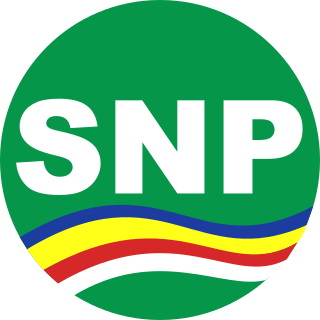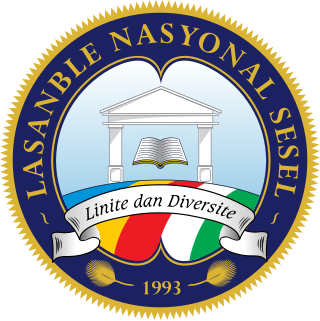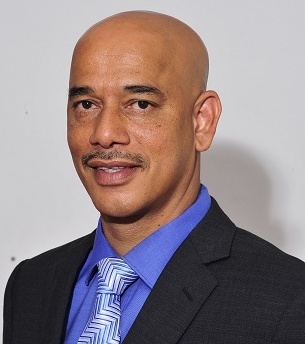
The politics of Seychelles have historical roots in both one-party socialism and autocratic rule. Following independence from the United Kingdom in 1976, Seychelles was a sovereign republic until 1977, when the original President and leader of the Seychelles Democratic Party, James Mancham, was overthrown in a bloodless coup by the Prime Minister France-Albert René. René installed a single-party socialist state under the Seychelles People's Progressive Front in 1979 which remained in power until 1993, when multiparty elections took place for the first time since independence, after restoring the multi-party system in 1991. Modern day Seychelles governance takes place in a framework of a presidential republic, whereby the President of Seychelles is both head of state and head of government, and of a multi-party system. Executive power is exercised by the government. Legislative power is vested in both the government and the National Assembly.

France-Albert René was a Seychellois lawyer, politician and statesman who served as the second President of Seychelles from 1977 to 2004. He also served as the country's second Prime Minister from its independence in 1976 to 1977.

United Seychelles is a political party in Seychelles. It publishes a newspaper called The People. It was known as the Seychelles People's Progressive Front until June 2009, when it changed its name to the People's Party. The party changed its name again in November 2018, from the People's Party to United Seychelles.

The Seychelles National Party(SNP) is a liberal political party in Seychelles. Its followers emphasize active multiparty democracy, respect for human rights and liberal economic reforms. It was founded in response to what it called the "totalitarian regime" of former President France-Albert René. It publishes a newsletter called Regar, which is frequently sued for libel by government officials. On Regar's front page of every issue is a quote from the constitution of Seychelles invoking their right to freedom of speech and freedom of expression.

Wavel Ramkalawan is a Seychellois politician and Anglican priest who has been serving as the President of Seychelles since 26 October 2020. Ramkalawan was an opposition MP from 1993 to 2011 and 2016 to 2020. He also served as the Leader of the Opposition from 1998 to 2011 and 2016 to 2020. On 25 October 2020, Ramkalawan won the presidential election, the country's first such victory for an opposition candidate since independence, marking its first successful peaceful transition of power.

The unicameral National Assembly is the Seychelles's legislative body.

Patrick Georges Pillay is a Seychellois politician who was the Speaker of the National Assembly of the Seychelles from 2016 to 2018. Previously he served as Minister of External Affairs and Minister of Health. In 2010, he was appointed resident High Commissioner to the United Kingdom.

Women in Seychelles enjoy the same legal, political, economic, and social rights as men.

The history of Seychelles dates back to the fourth of the Portuguese India Armadas led by Vasco da Gama, though Seychelles was likely already known to Arab navigators and other sailors for many centuries. On 15 March 1503, the scrivener Thomé Lopes noted the sighting of an elevated island, doubtless one of the granitic islands and almost certainly Silhouette Island. The first recorded landing was by the men of the English East India Company ship Ascension, which arrived in Seychelles in January 1609.The islands were claimed by France in 1756. Seychelles remained uninhabited until the first settlers arrived on board the ship Thélemaque, which arrived on 27 August 1770. Captain Leblanc Lecore landed the first colonists, comprising 15 white men, eight Africans and five Indians. The Seychellois Creole language developed as a means of communication between the different races. The British frigate Orpheus commanded by Captain Henry Newcome arrived at Mahé on 16 May 1794. Terms of capitulation were drawn up and the next day Seychelles was surrendered to Britain. Following the fall of Mauritius to British forces, Captain Phillip Beaver of the Nisus arrived at Mahé on 23 April 1811 and took possession of Seychelles as a permanent colony of Britain. The Seychelles became an independent republic in 1976. Following a coup d'état, a socialist one-party state ruled the country from 1977 to 1993. The subsequent democratic Presidential elections were won by candidates of the same party.

David Pierre is a Seychellois politician and teacher. He was a member of the Seychelles National Party until 2011. He then founded the Popular Democratic Movement.

Joevana Charles was a member of the National Assembly of Seychelles. She was a member of the Seychelles People's Progressive Front, and was first elected to the Assembly in 1993.

Patrick Herminie is a Seychellois politician who served as a Speaker of the National Assembly of Seychelles from 2007 to 2016. He was first elected to the Assembly in 1993 and served as Leader of Government Business from 1998 to 2003. He was a member of the People's Party and plans to run in the 2025 presidential election as the candidate for the United Seychelles Party (USP).

Parliamentary elections were held in the Seychelles on 6 December 1987 for the People's Assembly. The Seychelles People's Progressive Front was the sole legal party at the time, and all candidates were members. Thirty-six candidates stood for 23 seats, 10 of them unopposed. A further two members were appointed by President France-Albert René.

Presidential elections were held in the Seychelles between 19 and 21 May 2011, commencing on the Outer Islands on 19 May, with Inner Islands voting on 20 May and Mahé on 21 May. The result was a victory for incumbent President James Michel of the Seychelles People's Progressive Front, who received 55% of the vote in the first round.

Parliamentary elections were held in Seychelles from 29 September to 1 October 2011. The elections were boycotted by all the main opposition parties. As a result, the People's Party won 33 of the 34 seats in the National Assembly.

Parliamentary elections were held for the first in the Seychelles in October 1948. The Seychelles Taxpayers and Producers Association (STPA), which primarily represented the interests of large landowners, won all four seats.

Parliamentary elections were held in the Seychelles in June 1957. The Seychelles Taxpayers and Producers Association (STPA) won three of the four seats.

Presidential elections were held in Seychelles between 3 and 5 December 2015. As no candidate received more than 50% of the vote in the first round, a second round was held between 16 and 18 December. Incumbent President James Michel was re-elected, defeating opposition leader Wavel Ramkalawan by just 193 votes in the second round. Ramkalawan claimed there had been "many irregularities", including vote buying.

Parliamentary elections were held in Seychelles from 8 to 10 September 2016. Three parties and three independent candidates ran for the 25 directly-elected seats. The result was a victory for the opposition Linyon Demokratik Seselwa alliance, which won 19 of the 33 seats. It was the first time since the 1979 elections that the People's Party did not win a majority of seats.

General elections were held in Seychelles on 22–24 October 2020 to elect the President and members of the National Assembly. The National Assembly elections had been due in 2021, but in July 2020 were brought forward by President Danny Faure in order to hold them together with the presidential elections, a proposal supported by opposition parties.














